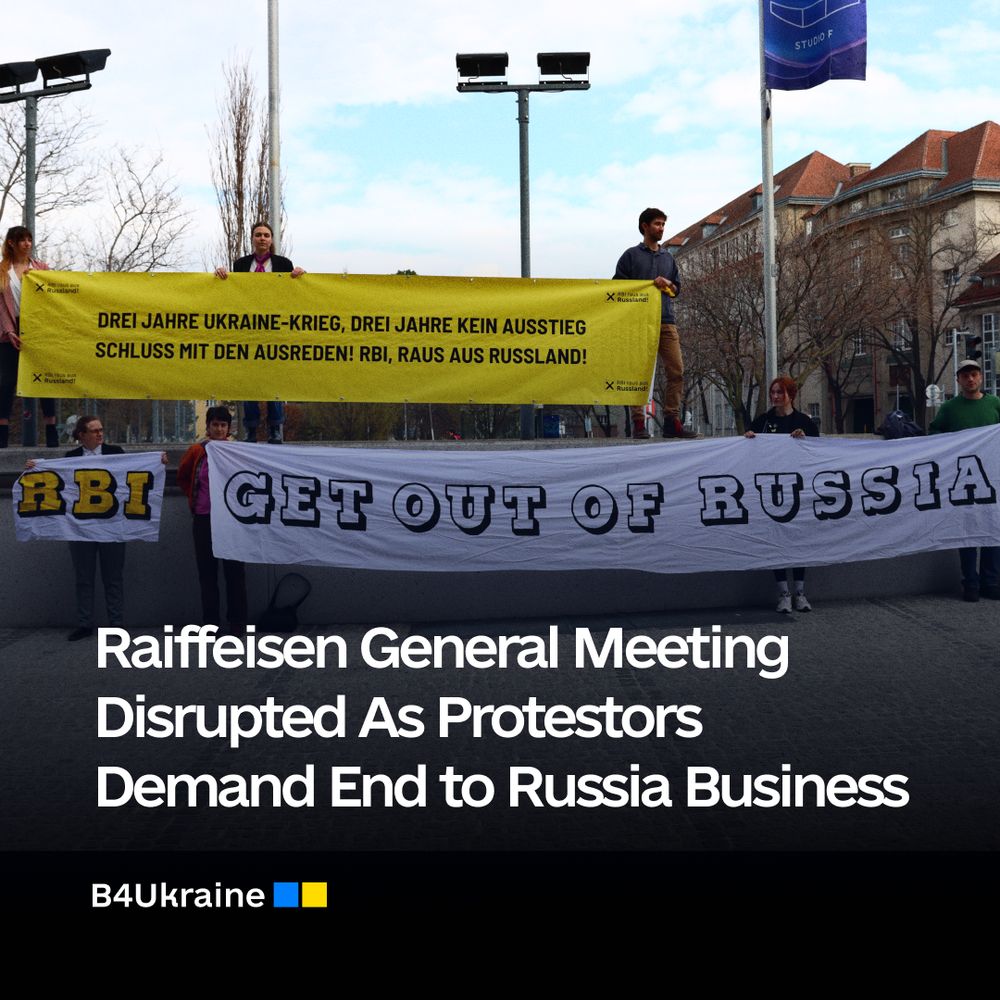
Protests held across Vienna on Wednesday as CEO lamented that public scrutiny of Russia business “distracts from bank’s strong overall results”
Raiffeisen Bank International saw its Russian operations cast into the spotlight again this Wednesday, as the bank’s Annual General Meeting was dominated by a series of protests inside and outside the assembly related to recent revelations about its dealings with state-affiliated entities in Russia.
Led by activists from BankTrack, B4Ukraine, WeMove and Attac Austria, dozens of protestors converged at a series of rallies and demonstrations across Vienna to demand an end to RBI’s activities in Russia and an increase in transparency over the bank’s Russian business relationships.
Speakers outside the AGM venue at the Wiener Stadthalle accused the bank of “undermining international sanctions designed to cripple Russia’s ability to wage war on Ukraine”, while protestors gathered around the headquarters of both Raiffeisen Bank International and the Raiffeisenlandesbank Niederösterreich-Wien – RBI’s largest shareholder – with banners describing the bank as “Putin’s ATM”.
Inside the meeting, discussions of the bank’s recent results were largely overshadowed by the recent controversies surrounding RBI’s Russian operations. Shortly after the board’s opening speeches concluded, several activist shareholders stood up and loudly accused the bank of “warmongering”, demanding answers over recent revelations that Raiffeisen’s Russian investment manager had invested millions in sanctioned Russian companies such as Lukoil, Gazprom, and Sberbank.
Attempts by chairman of the board Erwin Hameseder to continue the discussion proved futile, and the meeting was brought to a 15-minute interruption while the critical shareholders were removed from the assembly hall.
Raiffeisen Bank International, the largest international bank in Russia, continues to insist that it is working towards a sale of its Russian unit, is winding down its Russian operations under European Central Bank orders, and adheres to rigorous policies to ensure compliance with all applicable sanctions and human rights regulations.
But a series of recent investigations raise serious questions over the effectiveness and reach of these policies. Since early February, Raiffeisen has faced renewed scrutiny over claims that its network of Russian subsidiaries continue to provide services to Russian military suppliers, maintain investments in sanctioned Russian entities, and were instrumental in facilitating the delivery of billions of euros in foreign currency to Russia at the onset of the war.
In their opening speeches, Raiffeisen’s executives criticised and cast doubt on the veracity of these investigations: Chairman of the board Erwin Hameseder criticised journalists for “scandalizing the bank’s Russian business without any factual basis for doing so”, while CEO Johann Strobl claimed that the bank’s Russian operations “take up too much public attention and distract from the bank’s strong results overall.” Neither executive responded in detail to the content of recent investigations into RBI.
Raiffeisen management struck a similar tone later in the afternoon, when several activists demanded answers for the bank’s continued relationship with sanctioned Russian entities. Max Hammer, a Human Rights campaigner at BankTrack, noted that Raiffeisen’s Russian asset manager had recently deleted a website hosting financial documents detailing investments in a series of Russian state-owned companies and government bonds. “Given this lack of transparency and RBI’s refusal to respond to the content of these investigations, how can shareholders be expected to have confidence in RBI’s risk management and human rights policies?” Hammer asked.
Another activist, Victoria Nikolaevskaja, confronted the bank over its refusal to commit to a detailed plan for leaving Russia: “Why didn’t Raiffeisen develop a strategy to deal with this emergency while it was still possible to do so?… And what is RBI’s plan B now? How does the bank plan to proceed?”
In response to both questions, the board’s responses made reference to Raiffeisen’s previous public positions, emphasising that RBI maintains “extensive sanctions compliance and human rights policies” and is “reducing its business activities in line with orders from the European Central Bank.” A full positioning in response to the investigations Hameseder had previously described as “factually unfounded” was not offered to the shareholders, however.
The recent investigations into Raiffeisen’s business relationships in Russia have sparked widespread controversy and renewed demands for an accelerated exit from Russia. Nezir Sinani, Executive Director of B4Ukraine, noted that Raiffeisen “contributes more tax revenues to the Kremlin’s war coffers every year than any other foreign company and is therefore systemically relevant to Putin’s war economy.” Francesca O’Brien of Attac Austria: “RBI has a long history of providing services to a network of pro-Putin oligarchs across Europe. Recent revelations that the bank conducts business with sanctioned Russian warmongers underscore the urgency of a full exit from Russia”.